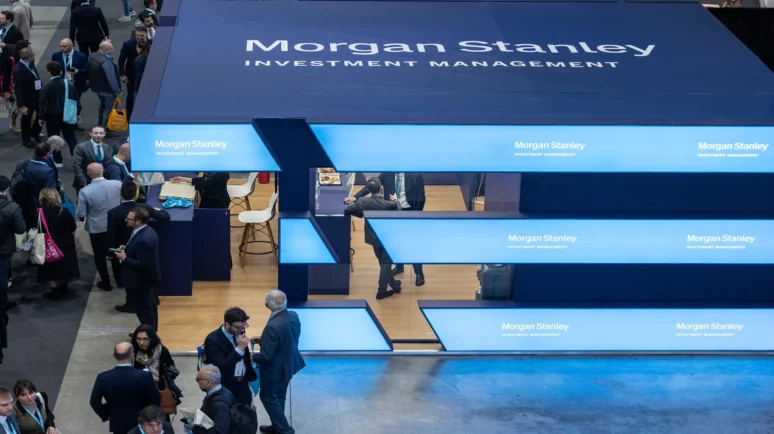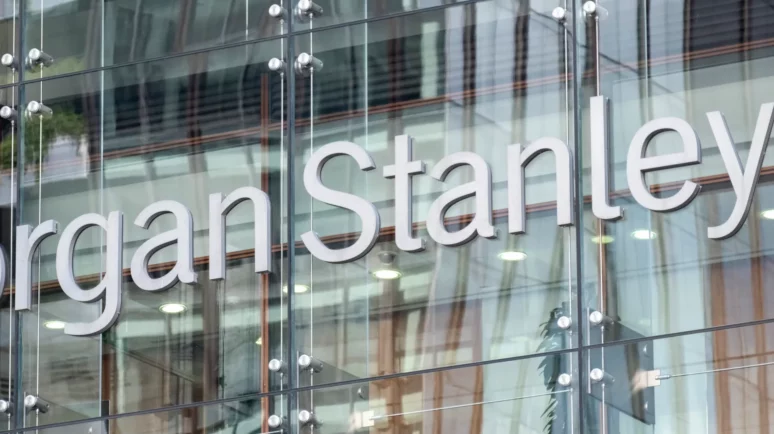Bitcoin ETFs Could Unlock New Investment Streams as Morgan Stanley Lets Brokers Recommend Them.

Morgan Stanley will allow brokers to actively recommend Bitcoin ETFs to clients. | Credit: Mike Kemp/In Pictures via Getty Images
, Key Takeaways
- Morgan Stanley goes on the Bitcoin offensive, allowing its brokers to actively recommend BTC ETFs.
- Big banks are still cautious about cryptocurrency in general.
- The Bitcoin ETF boom could spark new investments.
Morgan Stanley is expanding its Bitcoin offerings by allowing its brokers to actively recommend Bitcoin ETFs to clients.
This comes after the company previously only permitted unsolicited Bitcoin ETF purchases earlier this year. Meanwhile, the growth following the launch of ETFs could see new investment streams come into play.
Morgan Stanley Ups Bitcoin Ante: Advisors Set to Recommend ETFs
This change signifies a strategic adjustment to more directly capitalize on the demand for spot ETFs, which facilitate investment in Bitcoin without direct exposure to the cryptocurrency itself.
Like many financial institutions, Morgan Stanley has provided access to Bitcoin ETFs since their regulatory approval in January. However, it has restricted this to unsolicited transactions, where clients must initiate interest. According to AdvisorHub , the firm is considering allowing advisors to recommend these ETFs.
However, this change could increase the firm’s liability. Morgan Stanley is reportedly developing “guardrails” for solicited purchases, which may include specific risk tolerance assessments, as well as limits on how much and how often clients can trade these products. A specific timeline for when these policy changes might be implemented is still unavailable.
Morgan Stanley declined to comment.
Big Banks Take a Cautious Dip into Bitcoin ETFs
Morgan Stanley and its peers, including Bank of America’s Merrill Lynch and Wells Fargo, have adopted a cautious approach to Bitcoin ETFs. They have only offered them on an unsolicited basis and, in some cases, exclusively to ultra-wealthy clients. For example, Merrill Lynch needs customers to hold at least $10 million in assets before they can purchase a Bitcoin ETF.
In January, the Securities and Exchange Commission (SEC) approved 11 Bitcoin ETF applications from major firms like BlackRock, Ark Investments, Fidelity, Invesco, and VanEck. Despite these approvals, not all firms have chosen to offer these products. Raymond James Financial has opted not to include cryptocurrency products on its platform, while Vanguard has explicitly stated it sees no appropriate role for such products in long-term investment portfolios, as noted in a January blog post. This reflects a broader skepticism within some segments of the financial services industry regarding the integration of cryptocurrencies into traditional investment vehicles.
Cetera Equips Advisors for Crypto Clients
In February, Rob Pettman, former head of wealth management solutions at LPL Financial, stated that the firm, which boasts over 22,000 brokers and is the largest independent brokerage, planned to spend three months evaluating which Bitcoin funds to offer its customers. Pettman has since moved to fintech firm and software provider TIFIN, as announced earlier this month.
Cetera Financial Group, another independent broker-dealer, approved four Bitcoin ETFs in March for advisors to offer to their clients. The firm has also implemented additional educational and training resources for advisors using these products. To qualify, customers must have aggressive risk tolerances, and the firm has set allocation limits. Matt Fries, head of investment products at Cetera, said the firm would continually assess Bitcoin ETFs and related products and adjust their policies as necessary. He expressed enthusiasm about working with financial professionals to integrate Bitcoin ETFs into client strategies when deemed appropriate.
Bitcoin ETFs Mimic Gold’s Rise, Could There be New Inflows?
The rapid accumulation of assets by new financial products such as the $17.3 billion iShares Bitcoin Trust (IBIT) has significantly impacted the underlying asset’s market. This phenomenon is reminiscent of the effects seen with the introduction of the SPDR Gold Shares (GLD) in 2004, which heralded a substantial rise in gold prices. Over the next seven years, following the launch of GLD, the price of gold surged by 254%, climbing from approximately $700 an ounce to $2450.

By August 2011, GLD had become the world’s largest ETF, boasting $77.5 billion in assets under management. Such parallels suggest the introduction of major investment vehicles could have a profound impact on their respective asset classes.
The introduction of US spot Bitcoin ETFs has rapidly mirrored the impact seen with traditional asset ETFs, albeit over a much shorter period. In the three months following their launch, these ETFs amassed over $30 billion in assets. This inflow of investment has been a major factor driving Bitcoin’s price from $45,000 to new all-time highs above $73,000.

The demand for Bitcoin, fueled by new ETFs, could potentially outstrip the supply of newly mined BTC by a factor of ten. This imbalance could have significant implications for both market dynamics and the price of Bitcoin. It could, in turn, possibly lead to increased volatility and upward price pressures.


